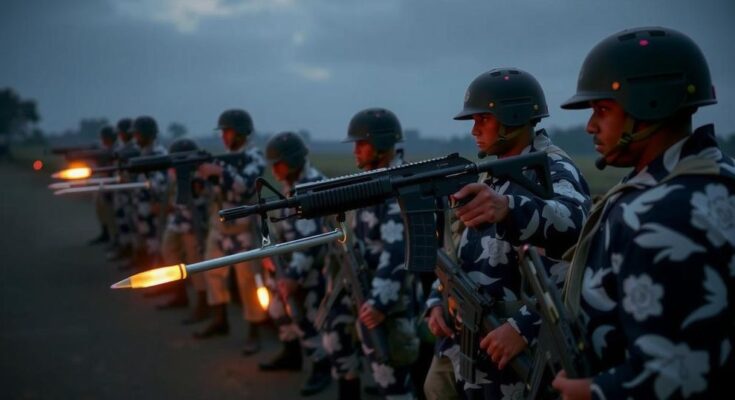Amnesty International reported that French weapons are being used by the Rapid Support Forces in Sudan’s civil war, violating a UN arms embargo. Claims indicate that these arms, particularly the Galix defense systems, are deployed against the Sudanese army amid serious human rights concerns. The organization calls for tighter export controls and an expansion of the arms embargo to cover all of Sudan.
Amnesty International has reported that French military technology is being deployed in Sudan’s ongoing civil conflict, violating a United Nations arms embargo. The organization claims the Rapid Support Forces (RSF) militia is using vehicles from the United Arab Emirates outfitted with French-made Galix defense systems in the Darfur region as they engage in conflict with the Sudanese army. Agnès Callamard, Secretary General of Amnesty, stated, “Our research shows that weaponry designed and manufactured in France is in active use on the battlefield in Sudan.” Despite the accusations, French authorities have yet to respond, while the UAE has consistently denied providing arms to the RSF. The Galix system, produced by French firms KNDS and Lacroix, is intended to protect land forces from close-range assaults. Amnesty International warned that such weapons could be utilized to commit grave human rights abuses and called upon the French government to ensure these companies cease their supply of this technology to the UAE. Evidence shared by Amnesty included verified images of destroyed military vehicles displaying the Galix system during battles in Sudan. The organization insisted that if France cannot guarantee through effective export controls that such arms will not be re-exported to Sudan, it must refrain from authorizing these transfers. The UN originally enacted an arms embargo in Darfur in 2004 following serious accusations of ethnic cleansing against non-Arab populations. Amnesty International has advocated for the expansion of this embargo to cover all of Sudan and the enhancement of monitoring mechanisms due to the recent civil war. The RSF, under General Mohamed Hamdan Daglo, has been engaged in a brutal conflict with the regular army, led by Abdel Fattah al-Burhan, since April 2023, amid escalating reports of ethnic cleansing and ongoing war crimes by both fronts, resulting in numerous casualties and displacements.
The civil war in Sudan has escalated significantly since April 2023, primarily between the paramilitary RSF and the Sudanese army. This internal strife has its roots in a power struggle between former allies that has resulted in widespread violence and dire humanitarian consequences. The situation is exacerbated by allegations of arms being supplied in violation of international regulations, notably the UN arms embargo first imposed in 2004 in response to ethnic cleansing claims in Darfur. The involvement of foreign military technology, particularly from France and the UAE, raises severe concerns over ongoing human rights violations in the conflict.
In summary, Amnesty International’s revelations regarding the use of French-made military technology by the RSF in Sudan’s civil war underscore the critical implications of international arms transfers in conflict zones. The potential for these weapons to facilitate human rights violations necessitates urgent advocacy for stricter export controls and adherence to UN regulations, particularly as the humanitarian crisis in Sudan deepens. Both the French government and the UAE face scrutiny over their roles in exacerbating this devastating conflict.
Original Source: www.bbc.com




